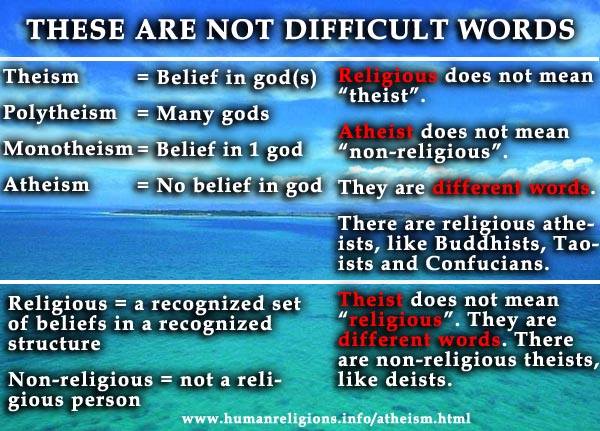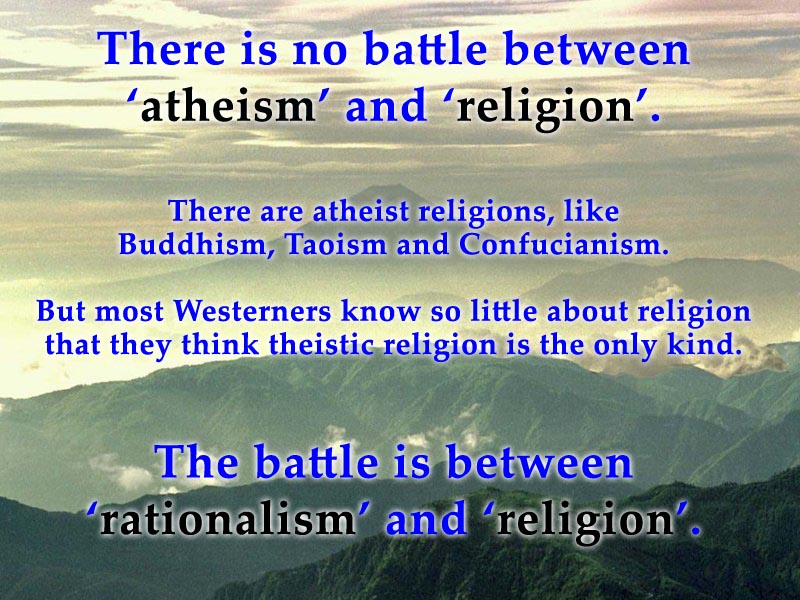Different Types of Atheism and Atheist Beliefs
https://www.humanreligions.info/types_of_atheism.html
By Vexen Crabtree 2016
#agnosticism #atheism #buddhism #china #christianity #greece #islam #monotheism #polytheism #religion #scientology #taoism #theism
An introduction to atheism in general:
“Atheism is the non-belief in god(s). Atheists are those who have no belief in god(s). After China, where fewer than 10% believe in god(s), the most atheist countries are Vietnam (81%), Japan (65%), Sweden (64%), Czechia (61%) and Estonia (49%)1. All humans (and animals, and everything else) are atheist until they first learn about the idea of gods, and come to believe in at least one of them. We're all born atheist2 just as we're also born non-religious and apolitical. Atheism isn't, therefore, "a religion" and nor should it be capitalized, any more than "monotheist" or "polytheist" should be. It is unfortunate that despite the minimalist meaning of the word atheist, many theists "eagerly pack that term with as many negative connotations as they can"2. Also in the English-speaking world, many people's definition of religion is biased towards monotheism
4 and so many people mistakenly think that "not believing in god" makes a person non-religious, and therefore, that anyone who is an atheist is non-religious. That's not true - there are some atheist religions, like Buddhism and Taoism, and "atheist" means only no belief in god(s) and does not mean "not religious in general". Atheism is not the opposite to religion, it is only the opposite to theism.”
Most scholars recognize two types of atheist, and some employ a few subtle schemes to differentiate between them, although most the time both types of atheist are given the same nouns. The most of famous of these distinctions is that made by scholar George H. Smith (1979):
Implicit atheist (lower case atheism) is a person who has not yet learned about god(s), theism or religion. All people are born implicit atheists.
Explicit Atheist (upper case Atheism) is an atheist who understands what a god is and who has concluded that no such beings exist.
And another pair of terms can be used for explicit atheists:
Gnostic atheists are those who are sure that no gods exist of any type. They have examined the philosophical arguments against god, and conclude that it is a self-contradictory or impossible concept. See God is Logically Impossible: The Argument for Atheism from Incoherence for some arguments that gnostic atheists might make.
Agnostic atheists are those who do not think that god(s) exist, but, who do not think it is possible to completely disprove their possibility. Many of these atheists simply haven't given much thought to it, and are unconvinced by the arguments they have heard so far that god(s) exist2.
This latter pairing makes it clear that, as with all beliefs, humans have varying degrees of certainty. Richard Dawkins' scale places theists on a scale between 1 (completely sure that god(s) exist) and 7 (completely sure of atheism). So, we have identified three basic types of atheist - implicit atheist, and two forms of explicit atheist (gnostic and agnostic).


There are a myriad of other terms that can be used to differentiate between types of atheist.
Antitheists are atheists who despise theistic religions, including Satanists and militant atheists.
Casual atheists haven't actively given the topic much thought, but know that they haven't been convinced that any gods are real. Many casual atheists know so little about religion that they often identify themselves with theistic religions such as Christianity even whilst not believing in god(s). See: Institutionalized Religions Have Their Numbers Inflated by National Polls: 1. Established Religions Become Default Religions.
Evangelical atheists are explicit atheists who actively try to convince others that no gods exist.
Humanists are atheists who explicitly embrace a conscientious morality based on behaving well towards others. See: Humanism and Human Rights and Secular Morals: Ethics Without Religion or Faith.
Militant atheists actively take real-world steps to damage theistic institutions. But violent battles between Buddhists and Muslims are usually called cultural violence as many reserve "militant atheist" for Western-world anti-religionists. This term is used frequently to refer to the biologist Richard Dawkins, author of The God Delusion5.
Religious atheists belong to a religion that has no belief in creator gods (i.e., many forms of Buddhism), or, are atheist members of a religion that has no defined belief (i.e., Scientology).
Strong atheist and positive atheist are both words for a gnostic atheist, although not all gnostic atheists are completely sure that gods don't exist - many are only quite sure.
Weak atheists are agnostic atheists. They lack belief in gods, but don't think it is sensible to say that gods definitely can't exist.
Some misuses of the word "atheism":
“Believers are correct about what atheism fails to give. It offers no philosophy of life or sense of purpose. But they point to this as if it is a strike against atheism. Clearly they have misunderstood atheism to be a religion or some codified way of life.”
"50 Reasons People Give for Believing in a God" by Guy Harrison (2008)6
“In a traditional Christian or Islamic society, people are expected to proclaim faith in God, with a strong commitment to a well-defined belief system. Under such circumstances, an Atheist may merely be someone who harbours serious doubt. Arguably, in a polytheistic society an Atheist may be someone who does not believe in enough gods, such that a monotheist could be accused of Atheism.”
"Atheism" by William Sims Bainbridge (2011)7
Unfortunately for Bainbridge, the word "atheism" does have a very particular meaning, from the Greek, meaning belief in "no gods", a-theos. In ancient, polytheistic Greece, Christians were indeed called "atheists" because of their rejection of everyday gods. This historical and technically incorrect usage of the word ought to be rejected else it cause mass confusion. If atheism and monotheism have the same interchangeable words to describe them volumes of texts on comparative religion would be ambiguous. The great benefit of using words to describe religions comes from the fact that words have meanings. Because once-upon-a-time Christians were called atheists does not mean that atheism can, or should, mean monotheist.
See: Atheism and Secularism. Its menu: